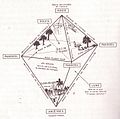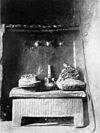Introduction The beliefs and practices of African people are highly diverse, and include various ethnic religions. Generally, these traditions are oral rather than scriptural and are passed down from one generation to another through narratives, songs, and festivals. They include beliefs in spirits and higher and lower gods, sometimes including a supreme being, as well as the veneration of the dead, use of magic, and traditional African medicine. Most religions can be described as animistic with various polytheistic and pantheistic aspects. The role of humanity is generally seen as one of harmonizing nature with the supernatural. (Full article...) Selected articleThe Mandé creation myth is the traditional creation myth of the Mandé peoples of southern Mali. The story begins when Mangala, the creator god, tries making a balaza seed but it failed. Then he made two eleusine seeds of different kinds, which the people of Keita call "the egg of the world in two twin parts which were to procreate". Then Mangala made three more pairs of seeds, and each pair became the four elements, the four directions, as corners in the framework of the world's creation. This he folded into a hibiscus seed. The twin pairs of seeds, which are seen as having opposite sex, are referred to as the egg or placenta of the world. This egg held an additional two pairs of twins, one male and one female, who were the archetype of people. Selected imagesFestivalsThere are several religious festivals found in the various Traditional African religions. Some of these are listed below next to their corresponding religion :
Selected biographyEileen Jensen Krige (1905–1995) was a prominent South African social anthropologist noted for her research on Zulu and Lovedu cultures. Together with Hilda Kuper and Monica Wilson, she produced substantial works on the Nguni peoples of Southern Africa. Apart from her research she is considered to be one of the 'pioneering mothers' of the University of Natal, Durban, South Africa, where she taught from 1948 until retirement in 1970. She inspired many women to devote themselves to research. Krige is also associated with a group of South African anthropologists who were strongly against the segregation policies of apartheid in South Africa. These include amongst others, Isaac Schapera, Winifred Hoernle, Hilda Kuper, Monica Wilson, Audrey Richards and Max Gluckman. Selected quote
On the influence of African religion on art, Aloysius M. Lugira (2009), quoting Ladislas Segy (1975), Source: African Traditional Religion, Third Edition, 2009 by Aloysius M. Lugira, quoting Ladislas Segy, "African Sculpture Speak",Da Capo Press (1975), p. 118, ISBN 9780306800184
Did you know
Related portalsTopicsFor more Traditional African religion topics, see Category:Traditional African religions.
CategoriesWikiProjectsThings you can doAssociated WikimediaThe following Wikimedia Foundation sister projects provide more on this subject:
Discover Wikipedia using portals
|



















































You must be logged in to post a comment.